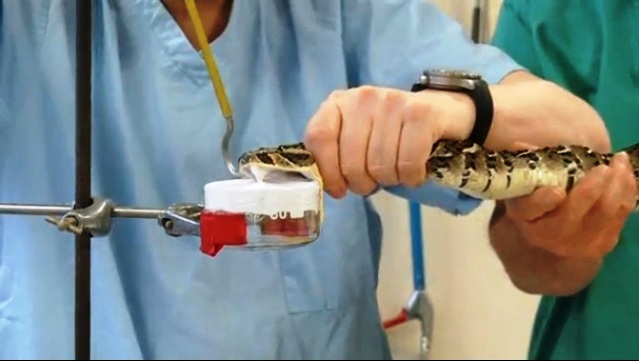
Doctors Without Borders is warning that global stocks of a critical snakebite treatment are poised to run out next year—a troubling development that could put tens of thousands of lives at risk.
The organization said that French drugmaker Sanofi stopped making the product — called Fav-Afrique, which it said is the only treatment proven safe and effective to treat venom from some snakes in Sub-Saharan Africa — at the end of 2014. It said no replacement will be available for at least two more years, a crisis the medical aid organization says will lead to “more needless death and disability.”
“We are now facing a real crisis,” Gabriel Alcoba, a medical specialist in snakebites for Doctors Without Borders, also known by its French name Medicins Sans Frontieres (MSF), said in a statement on Monday.
The aid organization called snakebites “one of the world’s most neglected public health emergencies” — with an estimated 5 million people bitten by snakes every year, of whom 1 in 10 will die or be left with permanent disability. Recent figures indicate that snake bites kill about 100,000 people annually and disfigure approximately 400,000, many of whom are children, and most of whom are from poor, remote and rural areas. Despite these devastating consequences, Doctors Without Borders said, “global health actors show worryingly little interest in the issue.”

Snake bites leave an estimated 400,000 people with permanent disability each year. The boy pictured above, from South Sudan, had to undergo a leg amputation due to lack of access to care after being bitten by a snake. (Image Credit: MSF)
The organization said it has “hope” that Sanofi can start to generate some of the base material for the anti-venom and then refine it into anti-venom. Sanofi claims that it has been priced out of the market by competitors selling cheaper products, and has since switched to making a rabies treatment instead. MSF says that the cheaper drugs are not nearly as reliable as Fav-Afrique. The charity group wants Sanofi to step up to the plate to help stave off a looming health crisis.
The anti-venom Fav-Afrique is a powerful treatment that can counteract the effect of bites from 10 different snake species among the most dangerous in Africa and that belong to two families: Elapidae, which have slender bodies with smooth scales and a head with large shields, and Viperidea, which have long, hinged fangs.
The dwindling supply of Fav-Afrique is part of a larger issue with a lack of safe, effective and affordable anti-venom treatments that protect against species indigenous to Africa as well as Asia.

Above, a young Nigerian girl with lasting scars and debilitating contractures (hardening of muscles, tendons, and/or other tissues) following a bite from a black-necked spitting cobra (Image Credit: The Lancet)
Snake antivenoms are expensive and difficult to produce and mainly used by the poor. The treatments can cost $250-500 per victim, or approximately 4 years salary for the average person in rural sub-Saharan Africa, which puts antivenoms out of reach for many. They can also be difficult to store if refrigeration facilities are not available. Commercial producers, governments and organizations find it hard to see its cost-effectiveness. So despite the high fatality rates associated with snake bites, funding agencies do not list antivenoms as a priority.
Doctors Without Borders has called it a crisis of invisible victims because many are rural and impoverished. Because snake bites are not transmissible, many caretakers simply give up on treatments and are resigned to let the patient die.
Meanwhile, the Centers for Disease Control and Prevention (CDC) estimates that 7,000-8,000 people per year receive venomous bites in the United States, and only about five of those people die. The comparably high survival rate in the U.S. is attributed to the availability of medical facilities and treatments.
